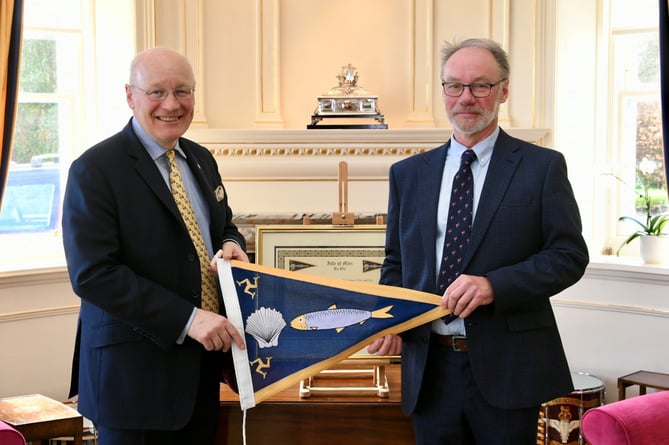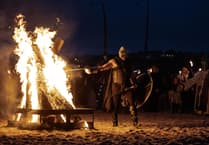A distinguished marine scientist has been appointed as the first ‘Admiral of the Manx Herring Fleet’ in more than 30 years.
The 420-year-old tradition has been reinstated after the island’s fishermen began catching herring in Manx waters again thanks to new UK quotas.
Dr David Beard was formally appointed to the now ceremonial role by Lieutenant Governor Sir John Lorimer at Government House in Onchan on Tuesday.
The new Admiral said: ‘I am incredibly proud to take on this role which holds immense historical significance.
‘It is a real honour.
‘The quota only became available due to the persistence and hard work of DEFA, particularly the Sea Fisheries Manager, Jack Emmerson, with the full support of Minister Clare Barber.
‘I would also wish to recognise the efforts of the Manx fishing community in responding to the opportunity and catching the herring quota within a five-week period last summer.
‘This is co-management at its best and a further example of the sustainable management approach adopted by both Government and the fishing industry within Manx waters.’
Traditionally, the Admiral of the Manx Herring Fleet was responsible for ensuring that the island’s farmers and boat owners followed the legal requirement to have their nets and vessels ready for the opening of the fishing season each year.
They were also tasked with monitoring fishermen’s conduct at sea with any misdemeanours dealt with by a land-based Water Bailiff.
At that point in history, the herring fishery was run almost like a military operation to ensure food security and economic prosperity for the island.
Despite the herring fishery employing more than 2,000 people at its peak in 19th century, the Admiral’s duties slowly diminished and eventually ceased altogether.
Although it was briefly revived in the 1960s and 1990s, nobody has held the role for more than 30 years.
Today, the recently reinstated Manx herring fishery is run by the government’s Department of Environment, Food and Agriculture (DEFA) and the Manx Fish Producers Organisation (MFPO), of which Dr Beard is the Chief Executive.
According to the Isle of Man Government, Dr Beard will play a significant role in ensuring Manx fisheries are sustainably managed by working with government to ensure regulations are fit for purpose.
Clare Barber MHK, Minister for Environment, Food and Agriculture, said: ‘The appointment emphasises the significance of the Manx fishing revival in recent years.
‘David’s appointment is symbolic of our efforts to preserve and sustainably manage our herring fishery, ensuring its prosperity for generations to come.’
Lt Gen Sir John Lorimer said: ‘Dr Beard’s appointment is a fitting way to celebrate the reintroduction of herring quotas in the Isle of Man and honour an important Manx tradition.’
Manx fishermen had been free to catch herring for centuries before the EU Common Fisheries Policy introduced quotas in the 1980s to allow stocks of the fish to replenish.
But by the time herring numbers had recovered most of the island’s fishermen had turned to focus their efforts on scallops.
Last year, we reported how three local crews of fishermen managed to successfully catch their allocated 100 tonne quota of herring in Manx waters within weeks of receiving Isle of Government support to diversify their operations.
The news led to renewed optimism that a commercially viable Manx fishery could be established for the first time in 25 years.
Speaking at the time, Minister Barber said that a functioning local herring fishery could reduce pressure on other stocks such as scallops in the coming years.
Last year, we reported how three local crews of fishermen managed to successfully catch their allocated 100 tonne quota of herring in Manx waters within weeks of receiving Isle of Government support to diversify their operations.
The news led to renewed optimism that a commercially viable Manx fishery could be established for the first time in 25 years.
Speaking at the time, Minister Barber said that a functioning local herring fishery could reduce pressure on other stocks such as scallops in the coming years.




